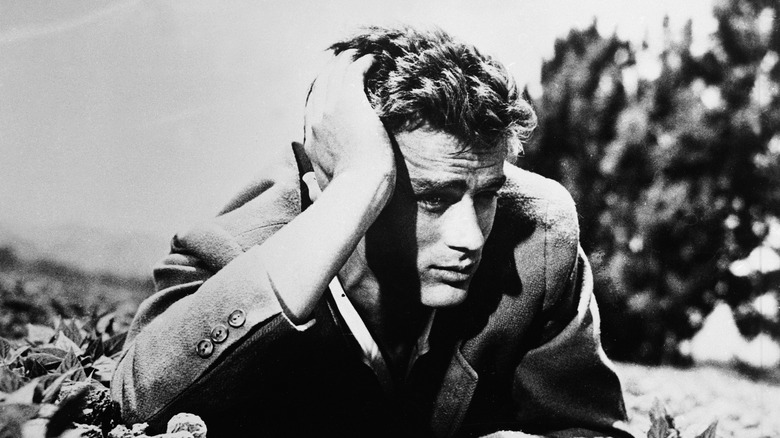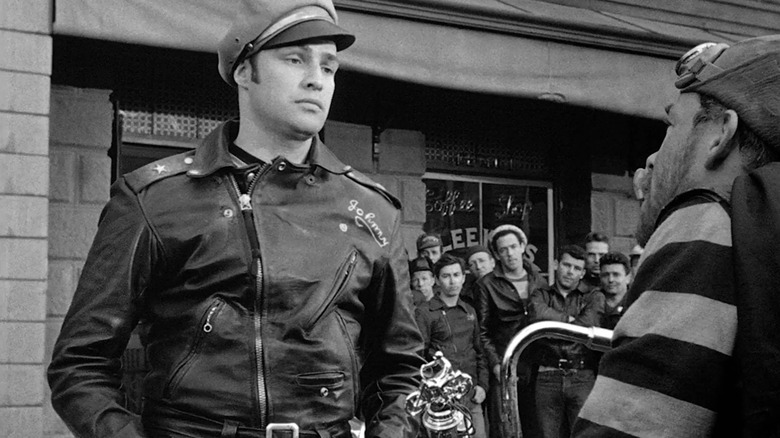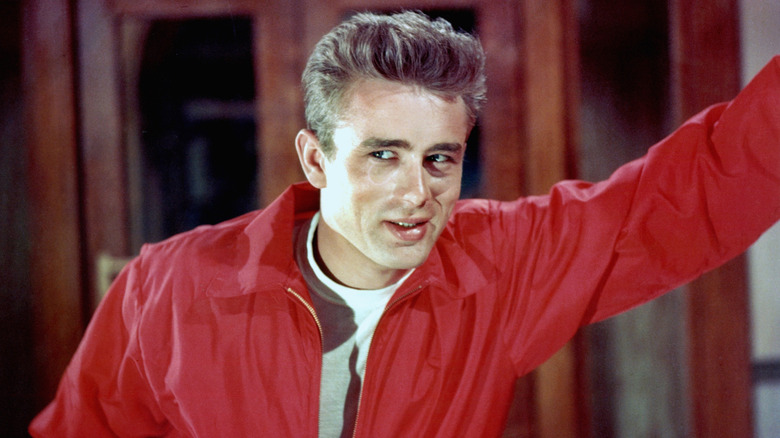James Dean's Rise To Stardom Didn't Sit Well With Marlon Brando
No more enjoyable conversation grudge match can be had than pitting James Dean against Marlon Brando in a Hollywood Heartthrob showdown. Which do prefer? The rough, raw honesty of Brando in László Benedek's "The Wild One," wherein he plays a humming, human motorcycle engine, tanked up on erotic, rebellious energy and living to subvert paradigms and dismiss 1950s squareness? Or the brooding, poetic angst of Dean in Nicholas Ray's "Rebel Without a Cause," a sensitive, mature soul — even a little kooky — who may sometimes let pride get the better of him, but who would be content to form his own blissful, star-gazing queer polycule with a pair of classmates.
Each of the actors was also sexually open at a time when queerness was notoriously repressed and pilloried; remember when Rock Hudson and Liberace were "ladies men"? Commonly attributed to Dean is the quote "No, I'm not homosexual. But I am also not going through life with one hand tied behind my back." While Brando once told a biographer named Gary Carey "Homosexuality is so much in fashion, it no longer makes news. Like a large number of men, I, too, have had homosexual experiences, and I am not ashamed." Slay, bi kings.
Additionally, both Dean and Brando were noted practitioners of the Stanislavski Method of acting, which was coming into vogue in Hollywood in the 1950s. The Method dictated that actors try to actually evoke real emotions during their performances — often derived from their own perhaps-similar life experiences — in order to give the audiences a deeper touch of emotional reality (It's notable that Konstantin Stanislavski never asked actors to remain in-character when not on stage. That's not the Method).
Brando vs. Dean
With so much in common, it's curious that Brando resented the rise of Dean as a movie star. In Stefan Kanfer's 2008 biography "Somebody: The Reckless Life and Remarkable Career of Marlon Brando," Brando is reported to have felt that Dean was, essentially, stealing his act.
Brando's rise to fame in Hollywood was swift. His first film, Fred Zinneman's "The Men" is rarely noted upon, but a one-two-three-four-five punch of "A Streetcar Names Desire," "Viva Zapata," "Julius Caesar," "The Wild One," and "On the Waterfront" pretty much assured that Brando would be remembered for the rest of the century. An intense, talented young man, desired by men and women everywhere, Brando redefined sex appeal in the popular consciousness and was part of a new generation of acting. His ascent was well-covered by local newspapers, and it likely didn't help that Brando was reading these reports on the regular. His ego inflated to enormous sizes immediately, and he affected a king-like attitude when in public. In Kanfer's book, Brando is quoted as bloviating:
"Acting, not prostitution, is the oldest profession in the world. Even apes act. If you want to invite trouble from one, lock your eyes on his and stare. It's enough of an assault to make the animal rise, pound his chest and feign a charge; he is acting, hoping that his gesture will make you avert your eyes."
Stuff like that. He was, in his own mind, the cock of the walk.
Then, in 1954, a few outlets began describing a startling new talent on the horizon, a new talent they described as "The New Brando." This, as Kanfer pointed out, rather upset the Old Brando. The New Brando was James Dean.
Be yourself, not me
Dean began his acting career on television in 1951, and was quite prolific in the medium. The release of "East of Eden" in 1955 vaulted Dean to the very top of the Hollywood heap practically overnight, and, good golly, Brando couldn't stand it. Brando looked at Dean and saw, essentially, a "pretty boy" version of himself. The same penchant for t-shirts, the same "outsider" attitude. The same unapologetic sexuality. Dean also developed a reputation for removing his jacket and throwing it aside as he entered a party ... which was an old Brando move. Brando also didn't like the bubblegum "teen idol" looks of Dean — his square jaw, his impeccable hair — and wasn't shy about saying that out loud to dean's face.
Kanfer relates a story where Brando and Dean were attending the same party, and Brando pulled Dean aside to offer him some unfriendly advice. Brando is reported to have said "Jimmy, you have to be who you are, not who I am."
When Dean tragically died in a car crash in 1955 — after starring in only three leading film roles — his legend became cemented. Because of his premature death, a myth about Dean immediately began to form. A great talent lost at a young age, etc. Many award bodies gave Dean accolades for his brief life achievements. Brando looked on, presumably with intense ambivalence.
Brando, meanwhile, would live to the age of 80, and be nominated for multiple high-profile awards, some of which he would turn down; Brando famously declined an Oscar for his performance in "The Godfather" as a means of protesting Hollywood's decades-long mistreatment of Native Americans in movies.
Dean and Brando are largely no longer seen as rivals, but both became legends in their own rights.


